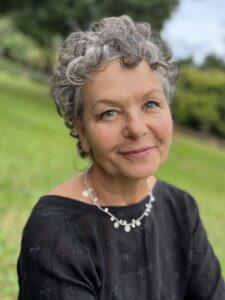Elizabeth Rosner‘s new work of nonfiction, THIRD EAR: Reflections on the Art and Science of Listening, will be published in September 2024. Her previous book of nonfiction, SURVIVOR CAFE: the Legacy of Trauma and the Labyrinth of Memory, blends personal story, interviews, and extensive research on the complex subjects of epigenetics and the inter-generational aftermath of war and atrocity. Called “breathtaking” by Pulitzer-prize winner Viet Thanh Nguyen, the book offers a comprehensive and intimate portrait of both individual and collective inheritance of history. Rosner was interviewed on National Public Radio’s “All Things Considered” and in the New York Times; SURVIVOR CAFE was a finalist for the National Jewish Book Award and named among the best books of 2017 by the San Francisco Chronicle.
Rosner’s third novel, ELECTRIC CITY, was published by Counterpoint Press in October 2014, and named one of the best books of the year by NPR. It’s a coming-of-age love story set against the historical backdrop of a company town in upstate New York that once called itself “the city that lights the world.” Featuring Charles Proteus Steinmetz, the protégé of Edison who electrified the early 20th century, and a love triangle among the children of Electric City in the late 1960s, the novel interweaves past and present to explore the way inventions transform cities, heart and lives.
A newly expanded poetry collection, GRAVITY, was published by Atelier26 Books in October 2014. Like Rosner’s celebrated novels, Gravity plumbs the deep complexities of inherited grief, but here the author discloses, with breathtaking candor and sensitivity, “what it felt like to grow up inside my family.” Also featuring spellbinding artwork by Lola Fraknoi, these astonishing pages remind us that history happens at home and that the past is something we all embody, knowingly or not.
Elizabeth grew up in Schenectady, New York as a daughter of Jewish holocaust survivors. Her father, who was born in Hamburg, Germany, was sent to Buchenwald concentration camp, while her mother survived the war by hiding in the Polish countryside. Much of Ms. Rosner’s writing reflects her efforts to come to terms with the impact of her parents’ experiences on her own life, the indelible imprints of their history on her language, her identity, and her imagination.
Elizabeth Rosner’s first novel, THE SPEED OF LIGHT, was published in hardcover by Ballantine Books in September 2001. The novel has been translated into nine languages, was included in Book Sense 76 twice, and was selected as one of Borders Original Voices. Its central theme addresses the effects of the holocaust on the descendants of survivors; it is a story of loss and the redemptive power of storytelling and love. The paperback edition of THE SPEED OF LIGHT came out in April 2003 and has remained a popular pick among book groups nationwide.
In 2002, THE SPEED OF LIGHT was the recipient of the Harold U. Ribalow Prize, administered by Hadassah Magazine and judged by Elie Wiesel, N. Scott Momaday and Myla Goldberg (the previous year’s winner). Hadassah additionally selected the novel for their National Book Club in spring 2003. Rosner also received the Great Lakes Colleges New Writer’s Award for Fiction in 2002. That award involved a lecture tour of ten colleges in the states of Michigan, Indiana and Ohio.
In 2003, the French edition of THE SPEED OF LIGHT (published under the title, DES DEMONS SUR LES EPAULES) was a finalist for the prestigious Prix Femina. In April 2004, the French awarded the novel a newly inaugurated literary prize, called the Prix France Bleu Gironde, at an award ceremony in Bordeaux.
Also in the spring of 2004, Rosner visited five upstate New York universities as part of a lecture tour co-sponsored by the New York State Writers Institute. When THE SPEED OF LIGHT was selected for Peoria Reads! 2004, a one city one book project, Rosner spent several days in Peoria, visiting with schools, libraries and appearing at numerous public events to meet with readers from all over the city.
Rosner’s second novel, BLUE NUDE, was published in hardcover by Ballantine in May 2006 and reissued in paperback in 2010 by Gallery Books (Simon & Schuster). The subject of the novel was originally inspired by her involvement with a project called Acts of Reconciliation, which brought together second generation Germans and Jews in order to confront their shared legacy from World War II.
BLUE NUDE depicts an encounter between a post-war German painter named Danzig and an Israeli artist’s model named Merav. Living in Northern California and in exile by choice from their home countries, both Danzig and Merav are wrestling with their identities as artists and as ex-patriates; haunted by their experiences with war and loss, they ultimately find that even in the face of fear and despair, the act of making art can bring real possibilities for redemption and healing.
This highly acclaimed novel has been a national bestseller and named as one of the San Francisco Chronicle’s best books of 2006. All of Rosner’s novels continue to be popular selections for book groups.
Elizabeth Rosner’s prize-winning short fiction and poetry have been published in numerous literary journals such as Poetry, Poetry East, Another Chicago Magazine, Catamaran, The Cream City Review, and Southern Poetry Review. Her essays have appeared in the New York Times Magazine, Elle, the Forward, and many anthologies.
Rosner is a graduate of Stanford University, the MFA Program at U.C. Irvine, and the University of Queensland in Australia. Now living in Berkeley, California, she is a full-time writer, having been an instructor of creative writing and composition at the college level for more than thirty years. She has traveled extensively throughout the world, including long-term stays in the Philippines, Israel, Australia, Sweden, and Mexico.
Photo by Tora Smart.
